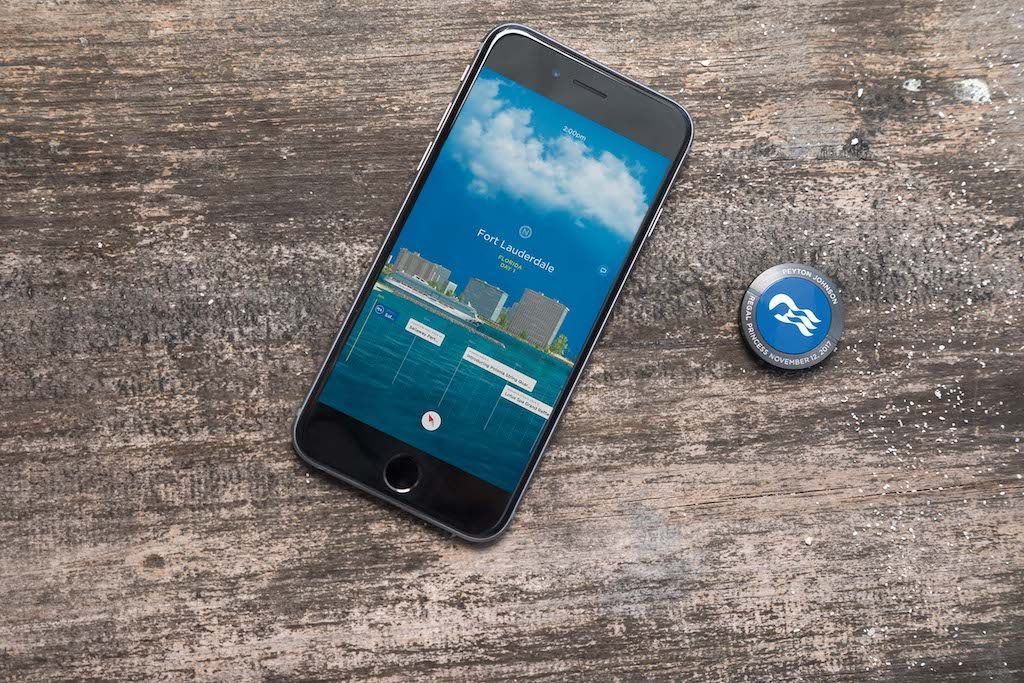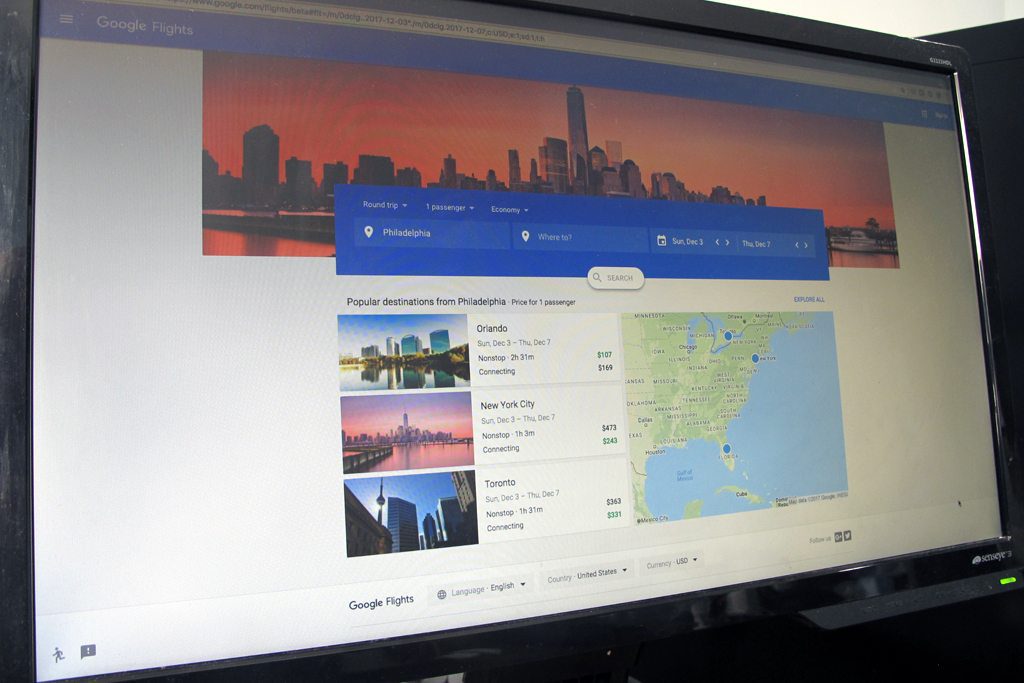25 Travel Moments That Mattered in 2017
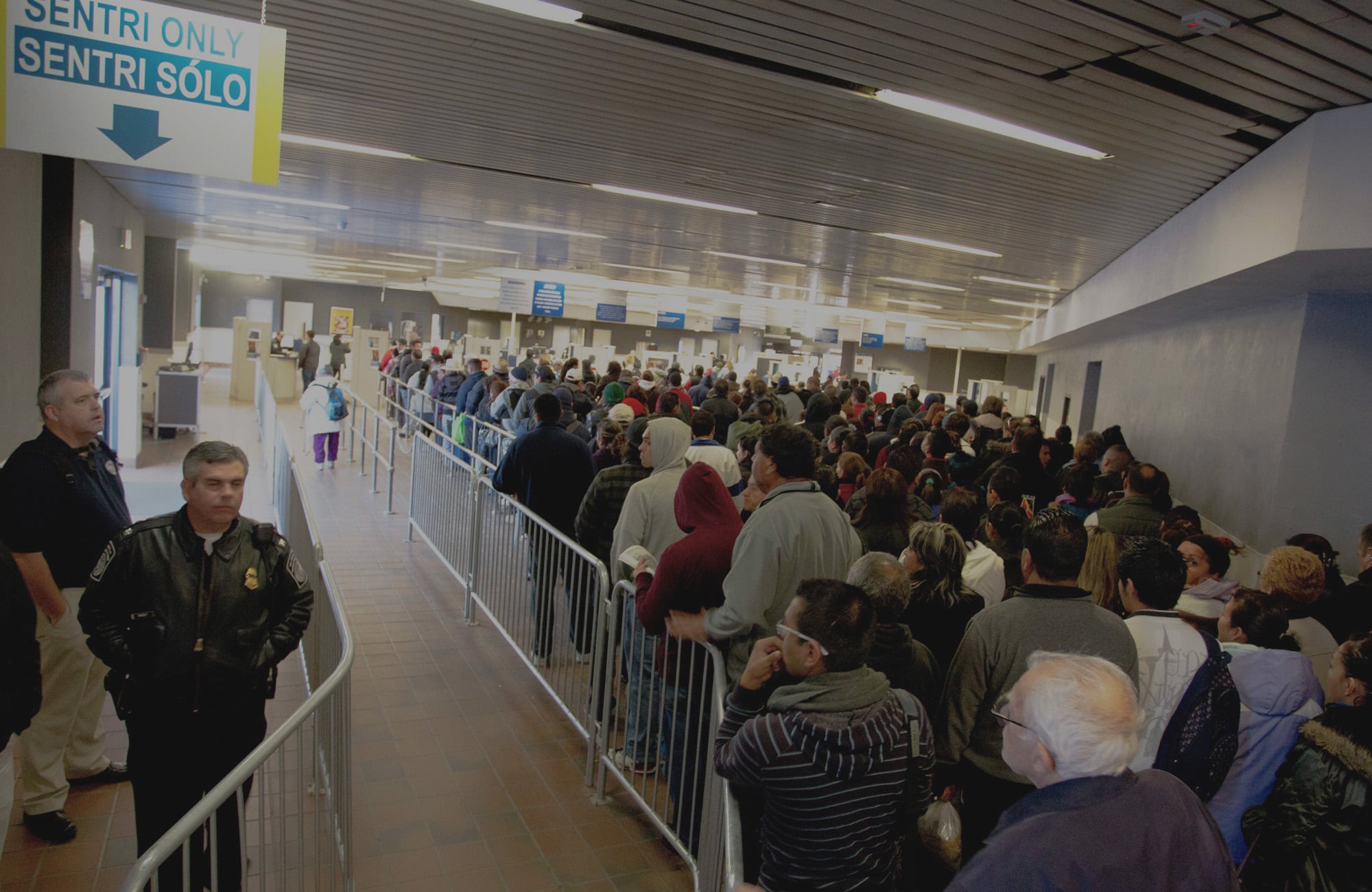
Skift Take
Taking a look at 25 stories that commanded our attention over the course of 12 months is a handy way of taking stock of what transpired. It was a year that was unlike many, as you’ll see in our annual presentation of 25 Travel Moments That Mattered, in this case for 2017.
Politics dominated the headlines, which were built out of travel bans in the United States; the UK confiding to the European Union that the divorce would indeed proceed; China’s decision to reroute cruises away from South Korea; a Saudi-led blockade of Qatar; a U.S. decision to cool off warmer travel relations with Cuba, and an historic vote in Catalonia to seek a split from Spain.
If politics wreaked havoc or hope, depending on your views, climate change seemingly tore the heart out of Caribbean tourism — or big parts of it, at least. Hurricanes ripped up tourist destinations from St. Maarten to Puerto Rico and the Florida Keys, and some of the locales will take years to recover.
In online travel, there were developments that no one could have predicted. The veteran Expedia CEO hightailed it to a troubled unicorn in Uber. The big-spending Priceline Group announced that it would bite the hand that fed it, namely retool its digital-marketing strategy with a tilt toward brand advertising and TV in the offing. And share prices for Expedia, Priceline and TripAdvisor sunk in a flash, although there was a debate about whether this was a blip or the new normal.
Some of the Travel Moments That Mattered in 2017 did matter because they spoke volumes about the future. The TUI CEO said blockchain could upend the distribution landscape and disperse the gatekeepers. And a $50 billion Airbus order for 430 A320 aircraft means you’ll be seeing plenty more ultra-low-cost carriers that are miserly about free overhead bin space for years to come.
Thinking of the year to come, one thing is certain: There are new moments that will matter that are in the formative stage right now. Kick back for the holidays. We’ll all need plenty of energy for 2018.
Dennis Schaal, Executive Editor
Carnival Promised a Cruise Game-Changer With New Wearable Tech
Early January
Why It Mattered:
The world’s largest cruise ship company made a big splash with its announcement of new wearable technology to better personalize cruising, but there’s an arms race going on now as competitors likewise make major technology investments.
Carnival Corp. kicked off 2017 with a keynote speech at CES to unveil, in glowing terms, a wearable bauble that functions as a room key, credit card, navigation tool, and preference-tracking device.
Chairman and CEO Arnold Donald referred to “an amazing use of technology that potentially redefines travel as we know it.” Another executive said that the device, called Ocean Medallion, “takes vacations to an entirely new level.”
The implementation timetable hasn’t been executed as planned. A few ships were to get the tech in November and into early 2018, but the line has delayed the rollout. Still, the kind of device and technology Carnival is readying highlights the evolution in store for the cruise industry.
While Carnival made the most noise with its announcement, rivals in the sector — especially Royal Caribbean Cruises — are building their own paths to better personalization, engagement, and so-called seamless experiences.
They are following a path that Disney paved with its revolutionary MagicBand (both Carnival and Royal Caribbean have Disney veterans working on their respective projects). But by adding these new capabilities, the lines are moving the cruise experience into the future.
Read More
Carnival Corp. Wants Wearable Tech to Elevate the Cruise Experience
Carnival Corp. Is Delaying the Full Launch of Its New Wearable Tech
Royal Caribbean Is Rolling Out New Tech to Make Cruising Easier
First Trump Travel Ban Caused Airport Chaos, Set Unwelcome Tone
January 27
Why It Mattered:
The United States has shed its image as a friendly destination for both vacationers and business travelers thanks to President Trump’s travel ban. The damage is broad and could be protracted.

People carry posters during a rally in support of Muslim Americans and protest of President Donald Trump's immigration policies in Times Square, New York, Sunday, Feb. 19, 2017. AP Photo/Andres Kudacki
One night in January, chaos broke out at international airports across the United States. The U.S. executive branch had suddenly banned visitors from a variety of majority-Muslim countries, and Customs officials were at a loss at how to implement the new restrictions. Reports of malpractice surfaced, which have been given credence by recent reports on how the ban was implemented.
President Donald J. Trump cited security and combating terrorism as his justification for the ban, but his earlier campaign comments calling for a Muslim ban resurfaced. Following a public outcry and several lawsuits from states including Hawaii, the ban was stayed in court, only to be followed by two more bans with a narrower scope.
The legal battle lingered throughout the year, with a more limited set of restrictions finally becoming approved by U.S. courts pending other appeals. The damage has been done, however, to the perception that the U.S. is welcoming place for international visitors, and Muslims in particular.
The Trump Slump in tourism is real. International arrivals to the United States fell 3.9 percent in the first six months of 2017 compared with a year earlier.
Read More
Trump’s Staff and Allies Aren’t Clear on Travel Ban Specifics
New Trump Travel Ban Targets Same Countries as Old Trump Travel Ban
Trump Travel Ban Block Is Extended Indefinitely
Trump Slump Means U.S. Tourism Is Losing Visitors From Its Most Important Markets
Barcelona Locals Occupied La Rambla to Protest Overtourism
January 28
Why It Mattered:
The overtourism protests and unrest that occurred in Barcelona and elsewhere helped transform the issue into a mainstream topic, and signaled the fact that local populations will not be passive bystanders as tourists — at times — overrun their cities.

A man sleeps in the beach as people protest against tourism in Barcelona, Spain, August 12, 2017. Manu Fernandez/Associated Press
Over the summer, anti-tourism protesters generated headlines across the world with stunts that included slashing tires on a tour bus and demonstrating on a popular beach. But it was a gathering of Barcelona locals in January that initially amplified the problem, and contributed to the issue going mainstream in 2017. Some 2,000 protesters occupied the city’s iconic La Rambla thoroughfare, holding up signs saying “Barcelona is not for sale.”
The protest coincided with a new law the city council enacted to regulate tourist accommodations. The big problem for locals and politicians is that the city is the perfect mix of sun, sea, and culture. Meanwhile, cheap airfares make this enticing concoction easily accessible.
Up until a terrorist incident in the summer and the Catalonia independence vote in October, visitor numbers in Barcelona had grown steadily over the years. While the tourist influx bolstered the economy, it put pressure on housing prices and adversely impacted many residents’ quality of life.
Airbnb, for all its benefits, has only exacerbated the overtourism dilemma by making cities much easier to visit for tourists across income spectrums.
Read More
Video: Barcelona and the Trials of 21st Century Overtourism
Proposing Solutions to Overtourism in Popular Destinations: A Skift Framework
Airbnb Moved Into Luxury When It Acquired Luxury Retreats
February 16
Why It Mattered:
Because it’s so fragmented, the vacation rental market — especially in the luxury realm — is ripe for disruption. Airbnb’s move into the luxury market diminishes hotels’ boast that sharing economy customers are a different and lower-spending demographic than their own clientele.

In February, Airbnb acquired Montreal-based Luxury Retreats. The luxury market is likely Airbnb’s next target for disruption. Luxury Retreats
When Airbnb purchased Luxury Retreats for a rumored $200 million to $300 million in February, it was a clear signal that Airbnb, now nine years old, has come of age and matured into a versatile travel and accommodations player.
Yes, listings for luxury accommodations like private villas and even castles have long existed on Airbnb. But it wasn’t until Airbnb bought a company that exclusively specializes in luxury accommodations and services that it became clear the luxury vacation rental market would be its next target market for disruption.
As the alternative accommodations sector becomes more saturated and mainstream, companies like Airbnb are looking to luxury for higher margins and growth. As with these more traditional vacation rental listings, including second or third homes, there are fewer regulatory challenges than with urban short-term rentals.
The lodging industry — hotels, timeshares, and vacation rental companies alike — should be paying close attention. For so long, hoteliers have said Airbnb is for different audiences and occasions, and travelers with less spending power. But now that Airbnb’s inventory encompasses just as wide a range of price points as the big, multi-branded hotel companies have, that argument is increasingly losing validity.
Read More
Airbnb Acquires Vacation Rental Company Luxury Retreats, Officially Moves Into Luxury
Airbnb’s Road to an IPO: Everything You Could Possibly Need to Know
Airbnb Is Readying Its Luxury Vacation Rentals Business
Airbnb Is Testing a Luxury Service That Will Include Inspections for Quality Control
Visit Florida Budget Battle Put Other Tourism Boards on Notice
February 21
Why It Mattered:
Visit Florida’s funding battle put tourism boards on notice that they need to be fiscally prudent and transparent or risk losing funding. They must do a better job of engaging with politicians to convince them of the benefits of tourism marketing.
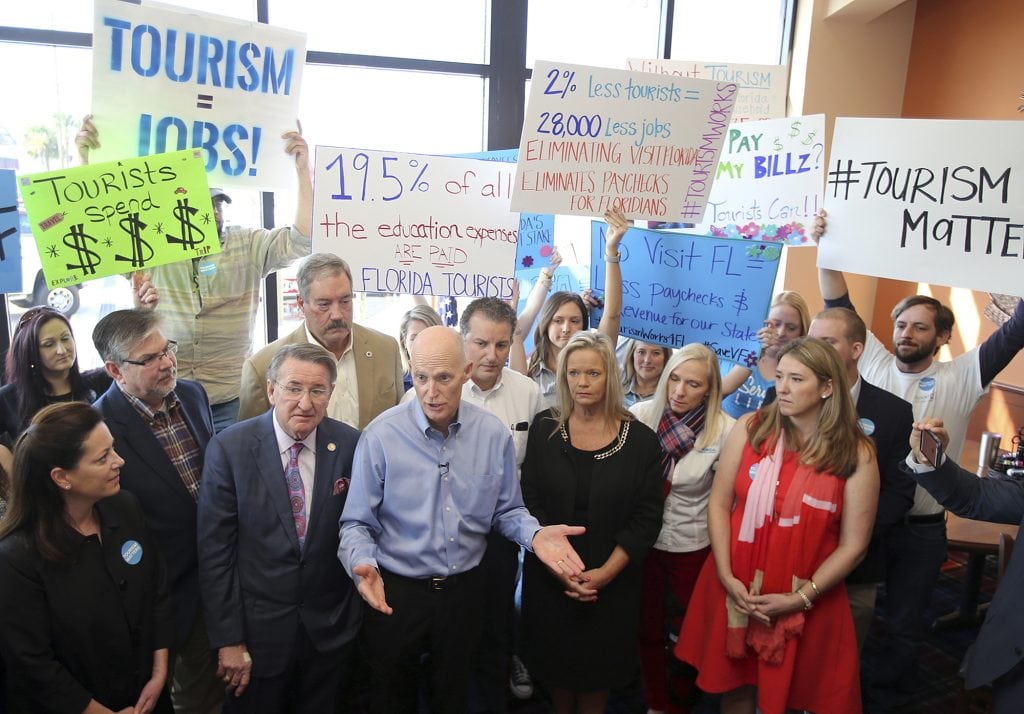
Lawmakers in Florida had a nasty battle in 2017 over the future of Visit Florida’s budget. Gov. Rick Scott (center) has generally been a proponent of spending money to market the state. Andrew Wardlow/News Herald via AP
Visit Florida’s high-profile budget crisis began February 21 and lasted until June. Some Florida politicians wanted to eliminate the tourism board’s budget after the disclosure in 2016 that Visit Florida secretly paid Miami rapper Pitbull up to $1 million to market the state to visitors.
The budget conflict drew attention to a sometimes-messy process that plays out periodically in local and national seats of government around the world. In Florida’s case, politicians argued that the state’s iconic reputation didn’t require such a large tourism marketing investment, and that Visit Florida had made too many irresponsible spending decisions.
Attracting throngs of additional tourists to visit a destination often requires marketers to make large cash investments, something tourism bodies around the world have understood for years. But when that destination is Florida – the world’s theme park capital and the most-visited U.S. state – politics come more fiercely into play.
Before state government resolved Visit Florida’s funding dispute in June, more than a dozen tourism boards in the state put their relationship with Visit Florida on hold while they learned how new transparency guidelines would affect them.
Eventually, the politicians relented. Visit Florida retained $76 million in funding for fiscal year 2018 — the same amount as in the previous year — although Florida Governor Rick Scott had wanted $100 million.
Lawmakers did, however, place restrictions on Visit Florida. Now, the Florida Legislature can review any contract worth $750,000 or more. And destination marketing organizations that do business with Visit Florida may see their finances and operations scrutinized.
Visit Florida’s funding controversy reminded U.S. tourism boards, many of which are taxpayer-funded, that they need to be budget-conscious and efficient. They also need to keep politicians engaged with the travel industry as the boards push their argument that sacrificing tourism marketing dollars is often economically counterproductive. These are lessons that aren’t lost on destination marketing organizations abroad, as well.
Read More
Visit Florida’s $76 Million Budget Gets Legislative Approval After 4-Month Battle
Visit Florida’s Budget Cuts Could Seriously Impact Florida’s Robust Meetings Business
Interview: Visit Florida’s Ex-CEO on Tourism Marketing Challenges in 2017
South Korea Dispute Dealt Setback to Cruise Lines in China
Early March
Why It Mattered:
North American cruise operators have moved into China in a major way in recent years. The ban on group travel to South Korea made key itineraries off limits for much of the year, and resulted in lagging prices. It became the latest hurdle in the fledgling Chinese market.
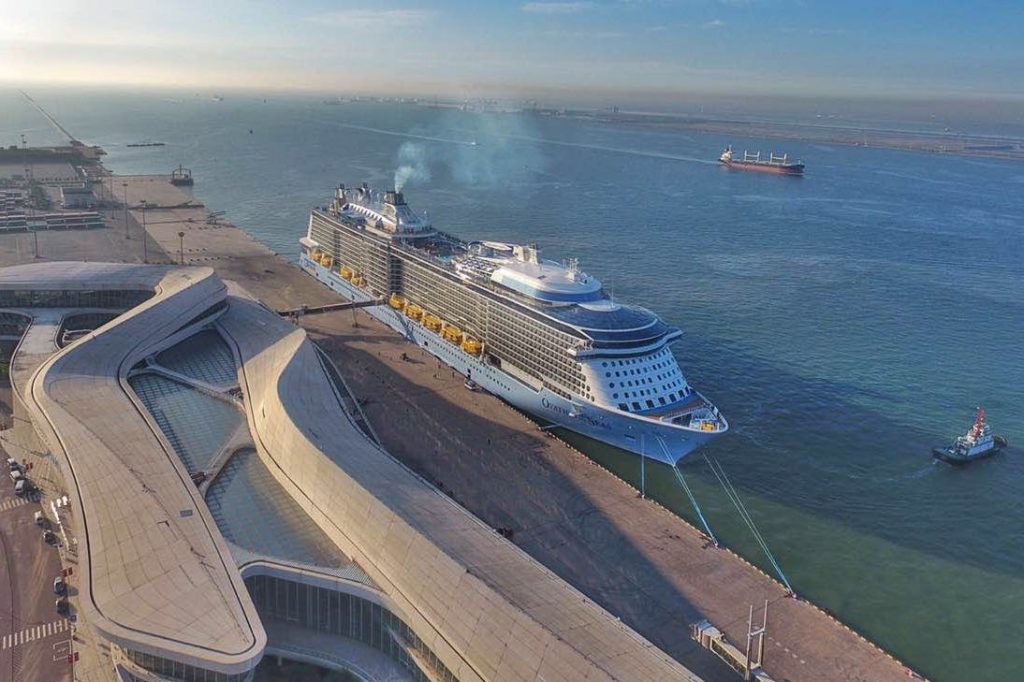
Royal Caribbean International's Ovation of the Seas is shown in Tianjin, China in 2016. Royal Caribbean International
Cruise operators were looking forward to 2017 as the year the fast-growing China market was supposed to become a little more normalized. Normal, it turns out, was not a word that could apply.
A dispute between China and Seoul over the deployment of a U.S. missile defense system meant China barred ships based in the country from docking in South Korea. Other Chinese outbound travel to South Korea was likewise affected.
Cruise substituted less-popular stops, and travelers were confused. The cruise business — typically driven by travel agents who charter entire ships or blocks of rooms — initially slowed.
The good news for cruise lines was that the appetite for cruising returned. By August, operators reported high occupancy numbers and in some cases record-breaking loads. There was also bad news: Those crowds getting on sailings were not made up of big spenders, resulting in lower prices for cruise companies with a history in the region.
Still, cruise executives pledged their dedication to the market for the long haul, despite fluctuations along the way.
“Perhaps the Chinese market is a little more volatile than some of the other more mature ones,” said Norwegian Cruise Line Holdings president and CEO Frank Del Rio, whose company sent a new ship to China in 2017. “But we’re committed to being in China in the long term.”
Read More
China-Based Cruise Ships Are Skipping South Korea Amid Tensions
Carnival Says China Is a Good Long-Term Cruise Bet Despite Ongoing Struggles
China Cruises Are Packed at Lower Prices Amid Tensions With South Korea
First Laptop Ban Led to Long Unproductive Flights for Business Travelers
March 21
Why It Mattered:
After being forced to jump through hoops, and relinquish their laptops on lengthy international flights to the U.S. and UK, life got a lot worse for business travelers in 2017.
When the U.S. and UK announced in March a ban on laptops and all devices larger than a phone in the cabins of certain international flights to the United States., due to vague threats of terrorist attacks, global airlines did their best to cope with the massive inconvenience to their most lucrative and frequent passengers: the international business traveler.
Besides the challenge of getting work done on the plane, information security concerns mounted for corporations around the world as data on checked laptops can be accessed easily without permission.
Gulf airlines led the way on flyer-friendly responses to the ban. Emirates began offering free Wi-Fi and tablets for use on affected flights. Etihad introduced a white-glove laptop check at the gate to allow travelers to work on their devices until they had to board.
Affected airports were forced to introduce new security measures in exchange for getting the bans lifted, and by July the laptop ban had ended. It’s likely, however, that similar bans may come along in the future in response to terrorism threats.
Read More
U.S. Bans Large Electronic Devices on Inbound Flights From Middle East and Africa
U.S. May Ban Laptops on All Flights From Europe, Report Says
Emirates Uses New Electronics Ban to Tout Its In-Flight Entertainment
UK Told EU It Intends to Bid Adieu as Brexit Talks Kicked In
March 29
Why It Mattered:
Invoking Article 50, as the UK did, means there won’t be a retreat from the country’s increasingly bitter divorce from the European Union. The official start of the departure process kicked off an anticipated two years of fierce negotiations that will undoubtedly reshape Europe.

EU Council President Donald Tusk holds up a letter he received signed by UK Prime Minister Theresa May formally triggered the beginning of Britain's exit from the European Union. Associated Press/Olivier Matthys
In March, the UK formally triggered Article 50 and announced its intention to leave the Europoean Union, giving it two years to agree to an exit deal with its biggest trading partner. As Prime Minister Theresa May said upon giving notice: “This is an historic moment from which there can be no turning back.”
If you’re already bored by Brexit, there is much more intrigue to come. The UK may have voted to leave the European Union in June 2016, but the divorce is some way off.
Since the Article 50 invocation, the two sides have agreed to some guidelines and timelines, and have decided to proceed to the second phase of negotiations. But there are still very big issues to iron out.
Will the UK stay in the single market and Customs Union, which guarantee the free flow of people and goods across borders, or will the parties sign a deal similar to the one between the European Union and Canada, which eliminates most trade tariffs but leaves in place other trade and financial barriers? And what will happen at the border between the Republic of Ireland and Northern Ireland.
There are other travel-specific questions: Airlines still have no idea whether they’ll be able to fly into and out of the UK on March 30, 2019, when the divorce would be final. There’s uncertainty about how Brexit would impact travelers entering the UK and European Union countries.
Article 50 started the process in earnest, and the outcome likewise will be serious business.
Read More
New Series Launch: How the European Union Invented Modern Travel and Tourism
Why the UK Travel Industry Isn’t Yet Suffering a Brexit Slowdown
Interview: VisitBritain Chairman Steers Tourism Boom Through Brexit Uncertainties
Overbooked Flights Took Center Stage as Passenger Was Dragged Off a Plane
April 9
Why It Mattered:
Most U.S. airlines — not just United — reexamined overbooking policies and how they interact with customers after security officers dragged a United passenger off an aircraft. Airline executives also learned that it is crucial to respond to such incidents publicly within minutes, and to take get it right as best as possible even in a very fluid situation.

Asian American community groups led rallies at Chicago O’Hare to protest United’s of an incident involving Dr. David Dao. United and other airlines changed their policies aftward. Chris Sweda/Chicago Tribune via AP
It’s hard to know whether the bigger problem was the incident — when security officers in Chicago dragged a United Airlines customer off a plane — or the airline’s response to it that caused an international uproar. Either way, April 9 is probably a day United’s employees will remember for awhile.
By now, most people know the story. United needed to bump four passengers from a United Express flight from Chicago to Louisville, Kentucky, so an airline crew could fly as passengers to their next assignment. One passenger, David Dao, a doctor, refused to deplane, and United called security to remove him. Three officers violently dragged him from the plane, as other passengers videoed the incident. The viral videos showed a bloody Dao, who didn’t seem to understand what was happening or why he was losing his assigned seat and purchased flight.
It would have been bad no matter what, but United executives didn’t seem to understand the severity of the public relations crisis. In early statements, the airline appeared to blame Dao. One statement from CEO Oscar Munoz defended airline employees and called called Dao “disruptive and belligerent."
It took United more than two days to change its posturing, and Munoz eventually issued a series of apologies. Eventually, United settled with Dao. The airline also made changes to its policies to ensure similar incidents do not occur and said it would overbook flights less often. But passengers still make jokes about the incident, and some travelers may be avoiding United because of it.
Other airlines also made policy changes. Southwest Airlines said it would stop overbooking flights — period. And at an industry event two months later, several CEOs said they had a new policy: They would issue contrite, if vague, apologies within 15 minutes after any incident. Some airlines also promised they would not call law enforcement for customer service issues unless absolutely necessary.
Some airline employees say they wonder if the incident changed flying permanently. Flight attendants and gate agents sometimes say they’ve seen passengers become more combative. And airline employees say customers are more likely to video anytime they’re having a disagreement with an airline staff member.
Read More
United Releases Internal Report on What Happened in Violent Chicago Incident
United Airlines Settles With Doctor in Dragging Incident
U.S. Senators Criticize Airline Customer Service in Committee Hearing
United Launched No-Frills Basic Economy Nationwide
April 24
Why It Mattered:
Before United introduced its Basic Economy fare, no mainstream U.S. airline had barred any passengers from bringing large carry-ons into the cabin. But now both United and American do it, and it looks like this is a trend that’s here to stay.
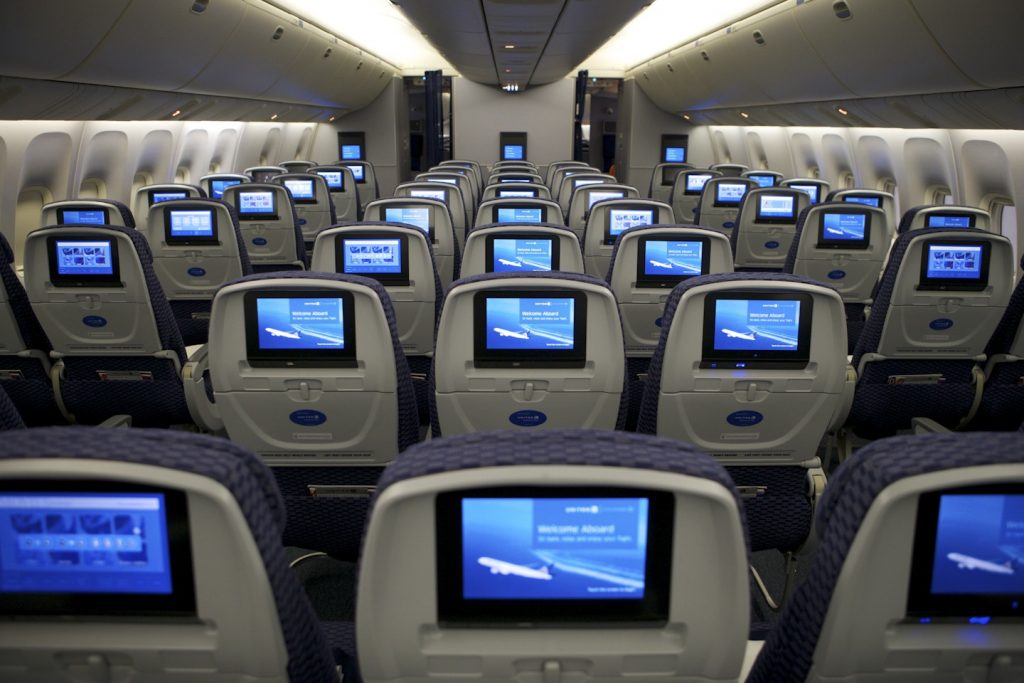
United Airlines was the first U.S. carrier to roll out a Basic Economy fare nationwide that does not let customers bring large carry-on bags. Passengers who buy it may only bring a purse or laptop bag. United Airlines
United wasn’t the first U.S. airline to introduce a Basic Economy fare — a cheaper option without some of the frills passengers have come to expect, such as the ability to select seats in advance, or a change to an earlier flight for a fee. Delta Air Lines introduced its Basic Economy product in 2012, and while passengers may not love it, they seem to accept it.
But United’s fare, which went nationwide in April, has one feature Delta’s does not. United does not allow most customers who buy it to stow a large bag in the overhead bins. Instead, they must pay to check luggage larger than a purse or laptop bag.
This feature has not been well-received. Many customers have complained on social media and elsewhere they were unaware of the restrictions, even though the airline warns them repeatedly about it online before they buy their tickets. Some customers are likewise not pleased a United employee must check a bag’s size before passengers can board with it.
Ultimately, though, this was a business decision. United’s Basic Economy fares are the cheapest it offers, and the airline didn’t want to give its most frugal customers all the perks of a regular ticket. If they want the usual goodies, they need to buy-up to what was once the entry fare.
United’s not the only airline with a no-bag policy on board for some tickets. American has it too, but the Dallas-based carrier’s nationwide rollout came later in the year. Meanwhile, Delta said it has no plans to copy its two main competitors.
Read More
United Says Customers May Dislike Basic Economy But They’re Buying It
British Airways Hopped on (Or Solidified) the Distribution Surcharge Bandwagon
May 26
Why It Mattered:
It looks like the airlines’ effort to claw back power from the global distribution systems has gained a second wind after more than a decade of trying. This is forcing big travel management companies to negotiate directly with the carriers for better deals.

International Airlines Group chief executive Willie Walsh expressed scathing remarks about the airline distribution middlemen in his recent earnings call with investors. IAG
Airlines are beholden to global distribution system networks to sell flights across the world, and 2017 has been a year of upheaval as European airlines have made moves to wrest control of the relationship back from their distribution partners.
International Airlines Group, parent company of British Airways and Iberia, fired a major salvo in May when it announced the airlines would place a surcharge on bookings made by travel agents through global distribution system platforms. This extra approximately $11 per leg of a trip makes flights more expensive when booked through an agent, forcing global distribution systems to come to the negotiating table.
The British airline giant followed in the footsteps of Lufthansa, which successfully introduced a similar fee in 2015.
We’ve already seen fallout from the new policy; Sabre was unable to reach an agreement with the airlines, forcing travel agencies to negotiate directly with International Airlines Group for better deals. The airlines would prefer to reach a private channel arrangement with agencies instead of dealing with the high distribution costs associated with global distribution system bookings.
With two European giants now embracing the booking surcharge, it should only be a matter of time until others follow suit.
Read More
British Airways Adds a Fee That Could Weaken Airline-Ticket Middlemen
British Airways Surcharge Means Travel Agents Won’t Get Lowest Fares Through Sabre
Lufthansa Calls Direct Booking a Success as British Airways Is Poised to Copy It
Disney and Universal Escalated Orlando Theme Park Wars
Late May
Why It Mattered:
Universal and Disney have been fighting for Orlando theme park visitors for decades, but this year brought the battle to new heights when the resorts opened much-hyped additions over the same weekend.

Pandora — The World of Avatar at Disney’s Animal Kingdom in Florida is shown in this promotional photo. David Roark/Walt Disney World Resort
When crowds of journalists had to figure out a plan for covering separate media opening events at Disney and Universal on the same day, you know competition in theme park central had reached superheated status.
Over Memorial Day weekend, the two theme park giants opened major new additions in Orlando: Volcano Bay, a water park at Universal Orlando Resort, and Pandora — The World of Avatar at Disney’s Animal Kingdom.
The openings were just the latest chapter in a years-long tale of two operators, each trying to give visitors more reasons to choose one over the other. After years of being the also-ran, Universal started to make real gains with the opening of its first Wizarding World of Harry Potter attraction in 2010. Another followed four years later.
Despite all the action in 2017, the theme park war will stretch on for years: Disney opens Toy Story Land next year, followed by Star Wars: Galaxy’s Edge in 2019. More changes, including new rides at Epcot, are slated to be in place by the Walt Disney World 50th anniversary in 2021.
For its part, Universal is building a new Nintendo-themed addition, though details on its size and timeline are still not public. And questions remain about Universal’s plans for hundreds of acres it has purchased in recent years. Ultimately, this might be the kind of war that both sides win.
Read More
Disney and Universal Keep Building So Visitors Stay Longer and Spend More
Disney’s Newest Land Is Meant to Add a Literal Glow to Animal Kingdom
Disney Is Hiking Its Spending on Park Projects by Nearly $1 Billion
Saudi-Led Blockade Created Qatar Airways Crisis
June 5
Why It Mattered:
The blockade was another example among many in 2017 of politics cluttering up the free flow of travelers. Isolation isn’t just a gesture. It really puts pressure on a country’s travel industry and psyche. In this case, Qatar Airways, and regional business travel, were hit hard.

Qatar Airways' CEO made operational adjustments due to the blockade by Gulf countries. Bloomberg
In June, Qatar began facing an economic blockade by Saudi Arabia, Bahrain, Egypt, and the UAE. These countries accused Qatar of supporting terrorism, and being too friendly with Iran. Since travel is so frequently tied up in geopolitical issues, the fallout came quickly for the country’s flag carrier.
The second-biggest Persian Gulf carrier, Qatar Airways, saw point-to-point flights become circuitous and time-consuming, while the airline had to scrap other routes altogether. Plus, these new longer flights meant higher operating costs for the carrier. Business trips among the Gulf countries suddenly became less feasible, and Qatar Airways headed for an annual loss.
Qatar Airways lost 19 destinations in the countries participating in the blockade.
Qatar claims to be committed to helping end global terrorism, but the blockade continues. Despite the ensuing isolation still cramping travel to and from the country. Qatar Airways CEO Akbar Al Baker vowed that the blockade won’t get in the way of the airline’s growth. But clearly, it has.
Read More
Understanding the Qatar Ban and Its Implications for Qatar Airways
Blockaded Qatar Will See Its Flag Carrier Lose Money This Year
Middle East is ‘brimming with extremism’ but Qatar doesn’t support terrorism
Marriott And Its Peers Tightened Their Cancellation Policies
June 15
Why It Mattered:
Hotels are becoming more sophisticated about how they’re charging guests and pricing their product. That’s a good thing for the hotel industry, but maybe not for guests.

In June, Marriot became the first major hotel company to implement a new more restrictive cancellation policy. Pictured is a Marriott front-desk employee. Marriott International
Marriott was first: On June 15, its newer, more restrictive cancellation policy went into effect, extending the deadline to cancel a room reservation from 24 hours to 48 hours before check in. Hilton and InterContinental Hotels Group followed the next month.
Last-minute cancellations lead to millions in lost revenue for hotels. They also make it harder for people looking for last-minute lodging to find a place to stay.
Some in the corporate travel sector were not pleased. The Business Travel Coalition issued a statement saying it was “deeply disappointed [and] concerned over Marriott’s new cancellation policy.” But travel management companies can still negotiate more favorable deals with the hotel companies to avoid fees.
The real reason these changes in policy are resonating is because they are a clear signal hotel companies are getting smarter and tougher about managing revenues and inventories. This will continue into 2018 and beyond.
Read More
Marriott Joins Competitors in Extending Cancellation Deadline From 24 to 48 Hours
Marriott and Hilton’s New Cancellation Policies Won’t Impact Corporate Travel as Much as You Think
InterContinental Hotels Group Institutes a 24-Hour Cancellation Policy
Trump’s Cuba Travel Retreat Not as Bad as Feared
June 16
Why It Mattered:
Trump’s decision to tighten restrictions on U.S. travel to Cuba wasn’t as large a reversal as many had feared. Cruise lines saw an advantage, but airlines’ initial bullishness has faded as demand hasn’t lived up to expectations.

U.S. tour operators aren't being deterred by policy changes towards Cuba. Pictured are tourists riding in a convertible in Havana. Marco Derksen / Flickr
U.S. President Donald Trump’s decision to rescind individual people-to-people visas for U.S. travelers to Cuba wasn’t the worst-case scenario although it did halt the giant leap forward both countries had made in normalizing relations over the past three years.
If 2016 was the most pivotal year the U.S. and Cuba had in more than 50 years with flight and cruise operations restarting, the Trump administration’s decision to roll back some of the easing up of travel travel restrictions disappointed many.
This year was a mixed bag for U.S. companies entering Cuba. On the airline side, Silver Airways and Frontier Airlines completely gave up on Cuba while Spirit Airlines downgraded its ambitions for the country. In the cruise industry, Norwegian continues to be bullish about Cuba while Carnival Corp. said that Cuba is a longer term play.
Regarding hotels, Marriott is taking a wait-and-see attitude toward its Cuba business, and AccorHotels said Cuba’s small size and scope doesn’t make it as relevant as other markets with growth opportunities. Cuba had been a growing market for Airbnb, although the new restrictions on individual travel was a setback.
Read More
U.S. Tour Operators Optimistic About Cuba Travel Because They’re Even More Essential
Norwegian Cruise CEO Says Cuba Sailings Are Selling Strong
U.S. Travelers Want to Go to Cuba But Brands Were Too Aggressive, Too Soon
TUI Boss Predicts Blockchain Will Crater the Industry's Powerhouses
June 22
Why It Mattered:
When the CEO of one of the world’s largest tour operators said that blockchain will disrupt travel distribution, people listened. And the fact that TUI, which historically fell behind the digital curve, is playing around with blockchain ahead of so many others, points to a new era for the tour company.
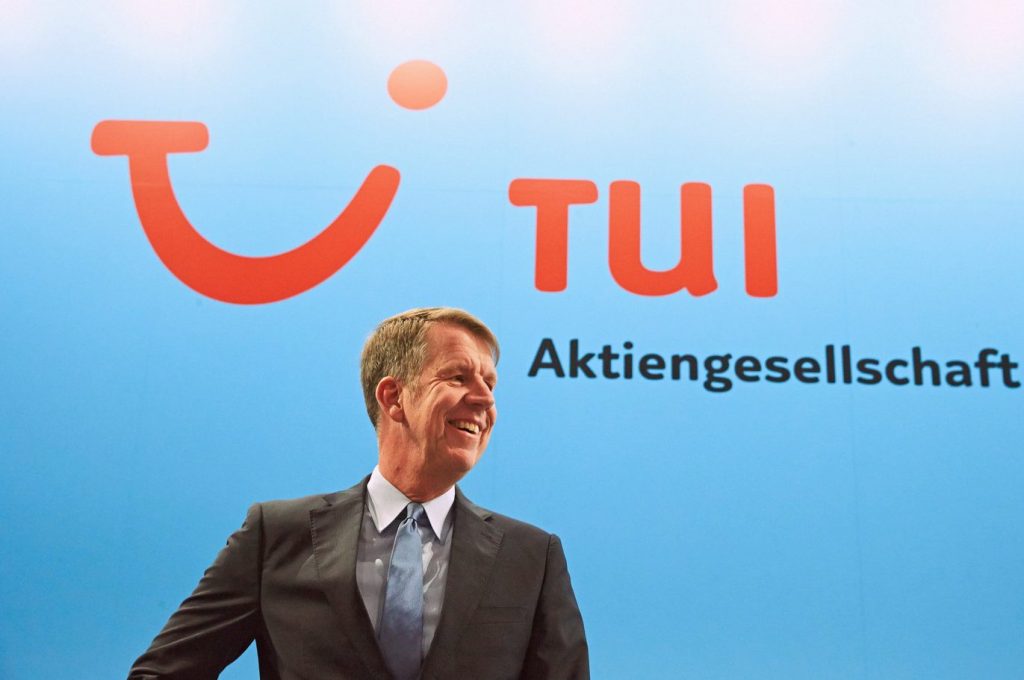
Fritz Joussen, CEO of TUI Group, thinks blockchain will revolutionize travel distribution. TUI Group
TUI CEO Fritz Joussen could be to blockchain what Stephen Hawking was to black holes. Like Hawking, Joussen’s a person of stature whose clear explanation of a knotty concept could lead many to grasp its full significance.
Speaking at a Noah Advisors conference in Berlin, Joussen said that blockchain would provider a lower barrier to entry for new distribution companies, and thus take away the power to charge high commissions from middlemen companies such as Airbnb, Amadeus, and Booking.com.
Being a blockchain buff can be an invitation to mockery, though. Many skeptics doubt that the technology will deliver more than modest efficiency gains for companies anytime soon.
Yet in the months that followed Joussen's speech, investment analysts started grilling the CEOs of the industry's top intermediaries about blockchain. That grilling may have caused the industry's top players to take the concept more seriously.
This autumn, Lufthansa and Air New Zealand each said they were developing relationships with blockchain vendors. Their moves helped to amplify Joussen's message.
For his part, Joussen has moved some of TUI's hotel technology onto its in-house blockchain by adopting so-called smart contracts. It plans a more elaborate adoption of the technology in the next two years.
Read More
Blockchain Will Disrupt Expedia and Airbnb, TUI CEO Says
6 Blockchain Takeaways From Tour Operator TUI’s Hotel Initiative
Skift Research Report: The Future of Blockchain in Travel Distribution 2018
EU Slaps Google With a Record Antitrust Fine as Travel Penalties Could Be Next
June 27
Why It Mattered:
When Europe's antitrust cop fined Google $2.7 billion, or €2.42 billion, it became the first major antitrust regulator to sanction the tech giant for its product practices. That development created a precedent that could have a big impact in the future on Google’s travel business.

Google has filed an appeal against an EU antitrust fine. Pictured, attendees pass a company booth at a developer conference. Bloomberg
When the European Commission fined Google for its comparison shopping services, where internet users browse retail products, it said, "Google abused its market dominance as a search engine by promoting its own comparison shopping service in its search results and demoting those of competitors."
Google had to pay the fine and change its search setup. But Google is trying to overturn the decision. The appeal process will last for years.
Will travel be next? The commission had included travel services as an area of concern when it launched its investigation in 2010. Google's flight, hotel, and vacation rental shopping services compete against metasearch brands such as Kayak, Skyscanner, TripAdvisor, and Trivago. Some of these online travel companies have backed a lobbying group, the European Technology & Travel Services Association, to contribute testimony to the commission's travel services investigation.
No travel-related decision is believed to be imminent, though. As of publication time, the European watchdog was instead expected to announce other possible fines related to Google's advertising program AdSense and its Android operating system. Any follow-on decisions by the European Commission could have ripple effects worldwide and into the travel sector.
Read More
Google Slapped With Record $2.7 Billion EU Antitrust Fine for Biasing Search Results
Google Sues to Block EU Antitrust Fine as Travel Probe Could Be on the Agenda
Google May Finally Face a Showdown With Regulators Over Its Evolving Travel Tools
Expedia CEO’s Exit for Uber Signals New Era for Online Travel Agencies
August 27
Why It Mattered:
Khosrowshahi’s surprise departure from Expedia capped off a changing of the guard at the big incumbent online travel agencies. For Uber, which has been tied to a wide array of bro culture and other abuses, the exit of its own CEO to make way for the Expedia boss was a harbinger of the #Me Too movement before it had a name.
The New York Times reported on a Sunday in late August that longtime Expedia Inc. CEO Dara Khosrowshahi, who had shepherded the company through numerous acquisitions and into market leadership in the United States over a couple of decades, had agreed to become the Uber boss. Khosrowshahi replaced Uber co-founder and CEO Travis Kalanick, who brashly led the ridesharing company into becoming a global brand, but was plagued by scandal after scandal.
Within days of Khosrowshahi’s appointment at Uber, Expedia named CFO Mark Okerstrom as Expedia CEO. Barry Diller, who has voting control of Expedia and is its senior executive, said he never considered anyone but Okerstrom for the CEO post once Khosrowshahi left.
Okerstrom’s succession of Khosrowshahi was the third CEO switch and replacement of veteran leaders in less than a year at the Big Three online travel agencies. In November 2016, Jane Sun became CEO of Ctrip as James Jianzhang Liang, co-founder and CEO, slid over to the executive chairman slot. At the beginning of 2017, Glenn Fogel became CEO of the Priceline Group, replacing interim CEO Jeffery Boyd, who had led the company to top dog status among the online travel agency pack.
It could be argued that Khosrowshahi bolted for Uber not only for perhaps the once-in-a-lifetime opportunity to lead a unicorn startup, but also because he saw tough times looming at Expedia. The challenges including integrating Expedia’s 2015 of acquisition of vacation-rental leader HomeAway; increased competition from Airbnb and Google, and harder times for Expedia-controlled Trivago in hotel metasearch, among other factors that might drag down growth.
Now, it’s all up to the new guy.
Read More
Expedia CEO Starts New Job as Uber Boss Today
Complete Oral History of Online Travel
Expedia CEO Dara Khosrowshahi to Leave Company With Unfinished Business
Hurricane Irma Reshapes Caribbean Tourism
September 6
Why It Mattered:
Climate change is here and a very tough hurricane season that reshaped a wide swath of Caribbean tourism may no longer be an aberration for warm-weather destinations.

Officials survey the beach of Great Cruz Bay for environmental impact as a result of Hurricane Irma and Hurricane Maria on St. John, U.S. Virgin Islands. Coast Guard News/Flickr
Four major hurricanes hit Texas, Florida, and the Caribbean in quick succession — Harvey, Irma, Jose, and Maria — just as these regions and cruise lines that serve them entered the high season. The storms caused an estimated $188 billion in damages, making 2017 the costliest season on record, according to AccuWeather.
In a one-two punch, Hurricane Irma decimated Caribbean islands such as St. Maarten, Barbuda, Dominica, and U.S. and British Virgin Islands beginning September 6, and then Hurricane Maria devastated Puerto Rico after making landfall September 20.
Puerto Rico was already suffering from a severe economic crisis and was especially hard-hit by Maria’s 155-mile-per-hour winds. Unfortunately, the U.S. territory received a colder response from President Trump than Texas and Florida. Puerto Rico has an uphill path to an expensive recovery ahead.
Even if a destination received more federal support than Puerto Rico, skilfull messaging is key to drive tourism, while being sensitive to locals’ ongoing struggles. Paulette Kluge, CEO of the Corpus Christi CVB, which saw its Gulf coast hit by Hurricane Harvey, said the tourism board is trying to invite tourists back while being honest about the destination’s capabilities.
“All of our hotels are completely full right now and have been since the day after the hurricane with first responders and insurance adjusters and remediation,” said Kluge in October. “Drive in, enjoy, and then go home, because there are no hotel rooms.”
Read More
Wyndham Took $13 Million Hit From Hurricanes in Third Quarter
Post-Hurricane Marketing in the U.S. and Caribbean Puts Tourism Boards to the Test
Trump Slams Puerto Rico But Island’s Tourism Leader Expresses Confidence in Relief Efforts
Las Vegas Mass Shooting Made Hotels Revisit Security Challenges
October 1
Why It Mattered:
This mass shooting in the United States, where legal and illegal guns proliferate, made the hotel industry rethink its policies and procedures for safety and security. Whether it will lead to meaningful changes remains to be seen.
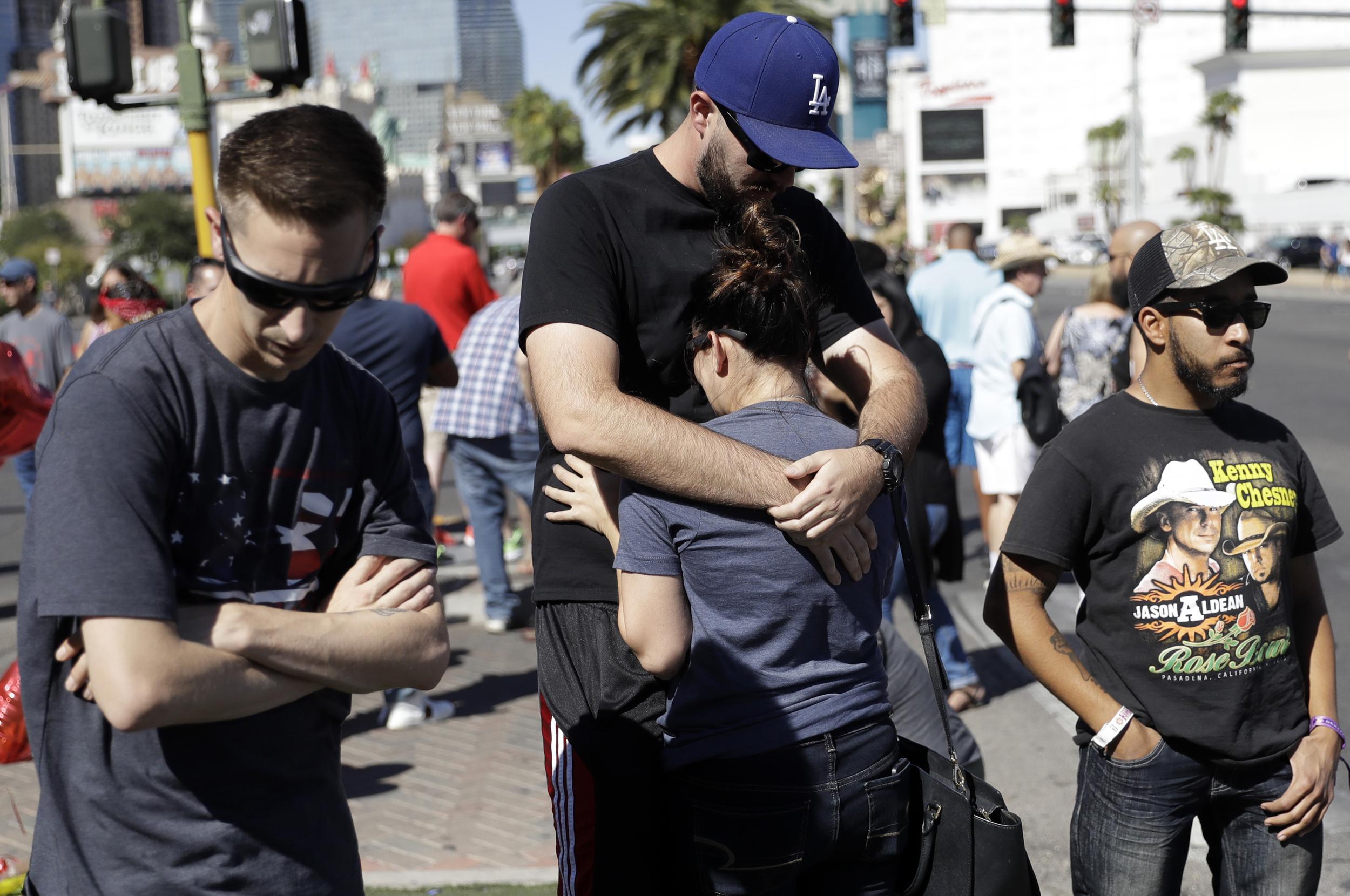
Reed Broschart, center, hugs his girlfriend Aria James on the Las Vegas Strip in the aftermath of a mass shooting at a concert. The couple, both of Ventura, California, attended the concert. Associated Press/Marcio Jose Sanchez
At the Route 91 Harvest Festival in Las Vegas on October 1, a gunman opened fire into a crowd of more than 22,000, killing 58 people and injuring more than 500 from his suite at the Mandalay Bay hotel. It was one of the deadliest mass shootings in U.S. history.
In the massacre’s immediate aftermath, the national conversation, at least briefly, turned to gun control — as is usually the case when mass shootings like this take place. And in this instance, that conversation also cast a spotlight on hotel safety and security measures as the gunman stockpiled his hotel room with weapons unimpeded.
The incident raised so many questions for the hotel industry to consider. Among them, what can hotels do when local gun laws make it legal for their guests to bring firearms into their rooms? Do hotels need even more surveillance than they already have? How can something like this be prevented from ever happening again?
At least one other Las Vegas Strip hotel, Wynn Las Vegas, installed metal detectors immediately following the shooting. But is it only a matter of time before hotels as standard procedure start installing metal detectors or baggage screening areas like airports do?
So far, the hotel industry hasn’t yet come up with all the answers to these questions, but many are working on it — they have to.
Speaking at a conference a few weeks after the incident, Marriott CEO Arne Sorenson said the issue is “probably more about the softer things. It’s about training. It’s about making sure our associates are keeping their eyes open. It is about things like how often do housekeepers go into rooms even if that do-not-disturb sign is on the room. We do all the things to do the best we can in that space, and then we pray.”
Read More
8 Questions About Hotel Safety and Security Raised by the Las Vegas Shooting
Marriott CEO Believes There Are Limits to What Hotels Can Do About Security After Las Vegas
Las Vegas Casino Execs Talk Security and Recovery After Shooting
Catalonia Declared Itself Independent From Spain
October 1
Why It Mattered:
Catalonia’s potential independence from Spain would have a huge impact on both in tourism and beyond. Spain’s most popular region in terms of international arrivals, Catalonia tourism has benefited from instability in countries such as Turkey and Tunisia, but the unrest in Barcelona has put all that into doubt.

Demonstrators holding banners that read in Catalan: "Freedom for the Political Prisoners", gather during a protest against the decision of a judge to jail ex-members of the Catalan government at the University square in Barcelona, Spain, Sunday, Nov. 5, 2017. AP Photo/Manu Fernandez
The Catalan secession movement has been bubbling away for more than a century, but rarely has it spilled over as dramatically as it did this year. The region’s standoff with the central Spanish government came to a head in October when Catalonia held a disputed independence referendum.
The authorities in Madrid refused to recognize the vote’s legitimacy and ordered police onto the streets to stop people from casting ballots. Violence ensued with images of the electoral and physical confrontation beamed around the world, helping to dent Barcelona’s reputation as risk-free place to visit. It also didn’t burnish Madrid’s credentials as a modern European democracy.
The street clashes, combined with a growing anti-tourism movement in the region’s capital, Barcelona, and a devastating terrorist attack, damaged visitor numbers.
Should these incidents have a knock-on effect to tourism numbers in 2018, then the local and national economies would suffer. Spain generates billions of dollars each year from tourism and Barcelona is its crown jewel.
Despite the growing anti-Spain sentiment in the region, the prospect of Catalonia seceding from Spain is seemingly diminished compared with the referendum’s immediate aftermath. Catalonia leader Carles Puigdemont had declared independence (sort of) and the Madrid moved to re-establish direct control. Several prominent Catalonia politicians were jailed, while Puigdemont fled to Belgium.
Although independence now appears more remote, the underlying issues will persist.
Read More
Catalonia’s Bid for Independence Is Complicating Tourism in Spain
Catalonia Tourism Forecasts $520 Million Drop in Visitor Revenue
Tourism Is the Biggest Loser So Far in Spain-Catalonia Standoff
Expedia’s Drop Triggered Debate on Tough Times Ahead
October 26
Why It Mattered:
Expedia Inc. saw its stock price plunge after reporting third quarter results, and the Priceline Group and TripAdvisor subsequently became saddled with their own share-price woes. These collective problems have left some investors wondering whether this is the new normal for heretofore leading online travel companies.
Was it a blip, or is this just the way it will be from now on for the presumptive leaders of online travel?
That was a question on the minds of investors, competitors, and other industry observers after Expedia reported lackluster third quarter earnings, and saw its share price fall some 20 percent to $117.32 over the course of two weeks on November 9.
Each of these competitors — Expedia, Priceline and TripAdvisor — had their own specific reasons for their respective swoons, but concerns about the need for increased advertising spend or other rising expenses was a common thread.
Expedia had also revealed that its HomeAway unit would not hit previously announced profit goals for 2018, and Expedia’s Trivago hotel-metasearch unit was piling up losses and under pressure from its largest advertiser, the Priceline Group, which was moving advertising spend on Trivago toward other companies.
For Expedia’s new CEO, who was conducting his first earnings call since taking the helm only weeks earlier, it was a tough beginning. He subsequently announced he would be turning the company away from big acquisitions and tilting it more toward organic growth.
Read More
New Expedia CEO Just Became His Own Guy in Outlining a New Strategy
CEOs of Expedia and Priceline Group — What Have You Done for Me Lately?
Booking.com Seriously Rethought Online Advertising as it Tilted Toward TV
November 6
Why It Mattered:
Booking.com is Google’s largest travel advertiser, and the Amsterdam-based online lodging seller historically set the pace in digital marketing. When travel’s leader in digital advertising says it will reconsider the amount of money it is spending on marketing through third-party online channels, the rest of the travel industry pays attention and listens.

The logo of online accommodation booking website Booking.com is pictured at the International Tourism Trade Fair (ITB) in Berlin, Germany, March 9, 2016. REUTERS/Fabrizio Bensch
Priceline Group CEO Glenn Fogel may have shocked partners and competitors when he revealed during the company’s third quarter earnings call that he was rethinking the company’s advertising spend on third party channels — metasearch companies Trivago and TripAdvisor come to mind — and would tilt spend toward brand advertising on TV.
Make no mistake: The Priceline Group, including its most important subsidiary, Booking.com, will keep spending billions of dollars on digital advertising. But it wants to balance things a bit more with a new emphasis on TV commercials.
That’s because Fogel thinks TV brand advertising will give his company a better chance to forge direct relationships with consumers instead of having to pay to acquire them and reacquire them through third parties such as Google, which use the windfall to compete against Priceline Group companies.
Trivago and TripAdvisor are already reeling because of Booking.com’s inattention in the form of diminished advertising spend. Prior to Fogel’s talk of a tilt toward TV, we couldn’t imagine writing this: But will Google, which has been making market share gains through Google Hotels and Google Flights, be the next company to feel Booking.com’s new digital thriftiness?
Read More
Inside Priceline Group’s Diss of Trivago — The Backstory
Video: Travel Investors on Why Booking Sites Still Have Plenty of Room for Growth
Google Flights Redesign Signaled an Enhanced Consumer Focus
Mid-November
Why It Mattered:
The competitive environment in online travel seems to be heating up, and Google’s expansion and consumer-focused moves appear to be a significant part of the mix. The design and technology tweaks tend to drive consumers away from traditional Google Search and into Google’s better-converting Hotels and Flights products.
The travel industry tracks Google's moves so obsessively you might be reminded of The Police's hit song, "Every Breath You Take."
Google made a variety of consumer-facing design tweaks that, when considered together, moved the company from being a research tool to more of a booking venue that is similar in style to Kayak, Trivago, and other metasearch, or comparison shopping, players.
The company unveiled a streamlined look for its flight search for desktop users. The first thing a consumer now sees is a stripped-down search box along with three suggested places to visit for low prices from the nearest big airport. The design change de-emphasized a once-prominent research tool that aimed to help undecided travelers discover destinations by entering their trip budget and time constraints.
Similarly, Google changed the design of its hotel metasearch product for mobile users. The design will likely coax more people to research and book rooms through its comparison search tool. These types of bookings may work better on mobile devices than sponsored search results, but they may also raise marketing costs for many hotels, airlines and online travel agencies.
In a further sign of its commitment to travel selling, Google rewrote its hotel front-end technology stack. The company also began testing in select European markets, such as in the UK and Germany, listings for flight-and-hotel packages and vacation rentals — in an expansion of its ambition.
The industry loves Google in the sense that it places more ads on it than anywhere else. But their love is twisted. Expect executives to keep humming the lyrics, "Every breath you take, every move you make, I'll be watching you."
Read More
Google Flights’ New Look Moves Away From Travel Inspiration
Google Hotels Revamps Mobile Features as Its Ambitions Expand
Google Travel Is Worth $100 Billion — Even More Than Priceline
Airbus $50 Billion A320 Order Meant a Boost for Ultra-Low-Cost Carriers
November 15
Why It Mattered:
The largest single Airbus order ever did not come from a U.S. airline, or even a Chinese one. Instead, it came in a joint order from four ultra-low-cost carriers on three continents. This suggests we would see big growth from discount airlines if and when these airplanes arrive.
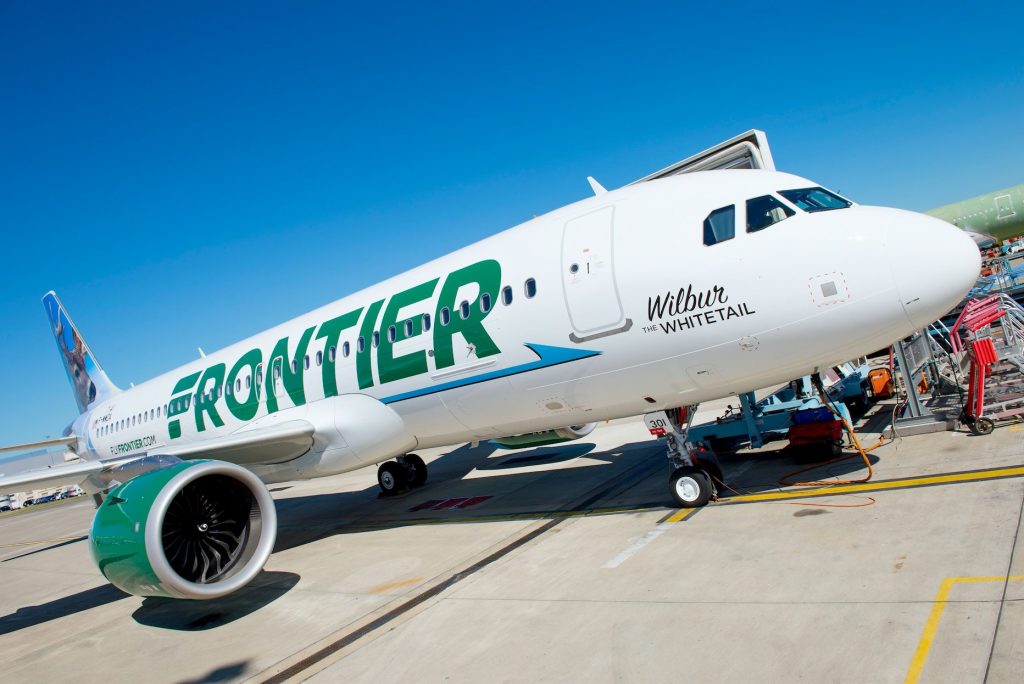
Frontier Airlines is one of four ultra-low-cost-carriers that will receive new Airbus narrowbody planes after its financial backer, Indigo Partners, negotiated a deal that will provide aircraft to it and three other airlines supported by Indigo. A. Doumenjou/Airbus
Before November’s Dubai Airshow, Airbus executives likely thought they’d make their biggest splash at the show with Emirates, which they expected to place a big order for new Airbus A380s. But that order fell apart, with Emirates unsure it wanted to invest in an aircraft Airbus may kill in a few years.
Instead, Airbus’ most important triumph came from one massive order split among four low-cost airlines many travelers don’t know much about — Frontier Airlines in the United States, Volaris in Mexico, Wizz Air in Hungary, and JetSmart in Chile. Combined, they committed to 430 Airbus A320 aircraft. Technically, it’s only a memorandum of understanding, but Airbus is confident the deal will be finalized.
It’s perhaps a sign that, while the most interesting story of the last decade might have been the build-up of the three largest Gulf carriers, all of which fly giant A380s, the future could be owned by ultra-low-cost carriers flying narrowbody aircraft. These are airlines that charge for anything regulators will permit, including seat assignments, drinks and, sometimes carry-on bags. The four discounters aren’t known for customer service, but they sell tickets for far cheaper prices than legacy airlines. In many cases, they’re less expensive than other low-cost-carriers, too.
Interestingly, the four airlines have no commercial ties. But they joined on an aircraft order because all have one major investor in common — Indigo Partners. The firm’s managing partner, Bill Franke, negotiated the deal, and is believed to have come away with an excellent price.
Read More
Why Airbus Lost Its Super Jumbo Deal With Emirates
Airbus Beats Boeing With $50 Billion Deal in Latest Aircraft Order Battle
Note: Skift reporters Hannah Sampson, Dan Peltier, Deanna Ting, Sarah Enelow, Sean O'Neill, Andrew Sheivachman, Brian Sumers, Patrick Whyte and Dennis Schaal contributed to this report.

